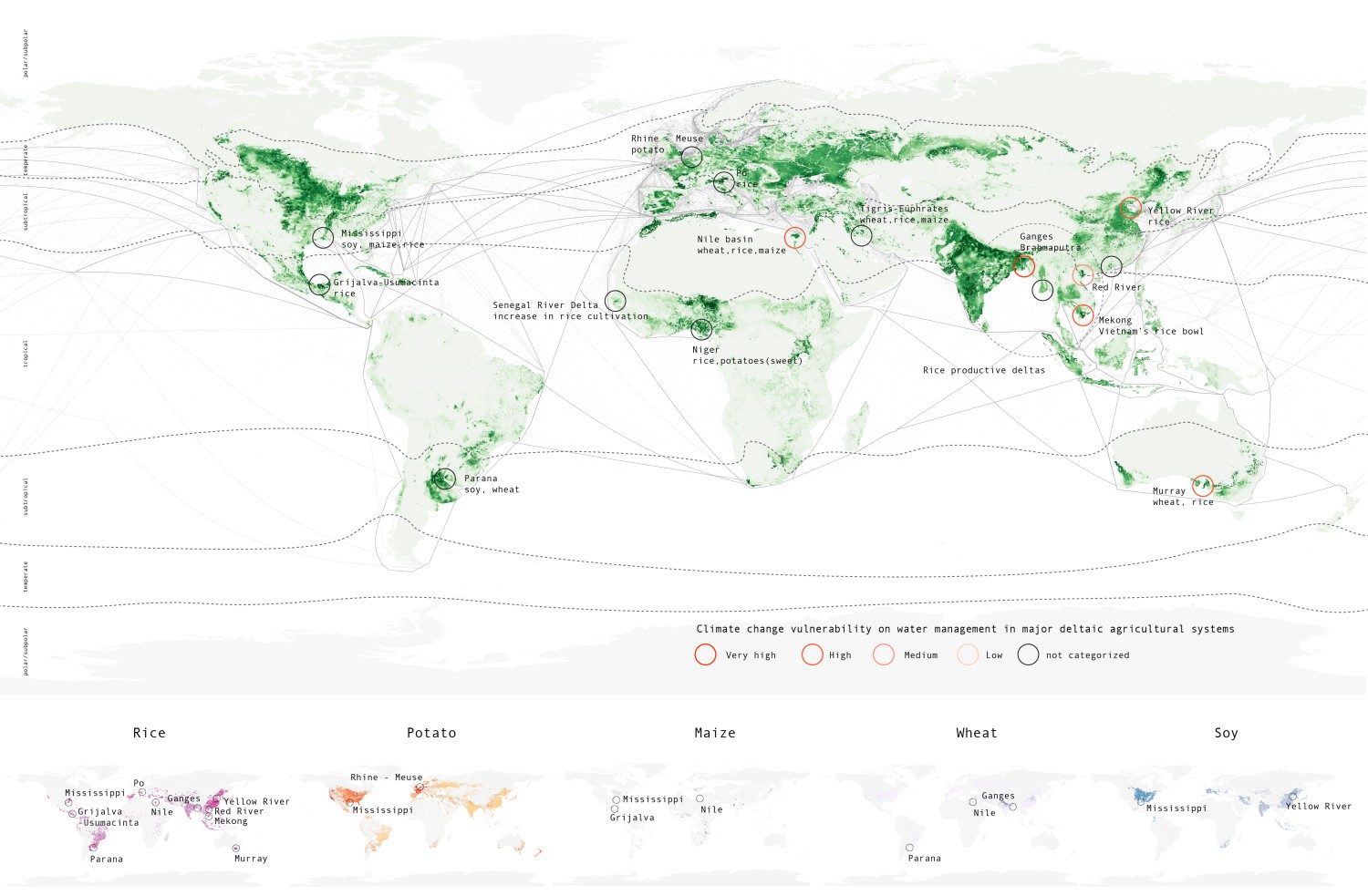Designing Against Disconnection
Research-by-Design Across the Longue Durée for a Resourceful Agroecological Delta Urbanism
This contribution reflects on the spatial disconnection between food systems and the delta territories that once sustained them. Drawing on research in the rice fields of the Mekong and the potato fields of the Rhine - Meuse deltas, this paper builds on Agroecological Urbanism and Delta Urbanism approaches aiming to tackle the question of agroecological transition through a critical reading of infrastructure, landscape, and time. The focus lies not only on what has been built, but on what has been disassembled: the relationships between soil, water, cultivation, and collective life.
Through a longue durée perspective, the paper traces how layered territorial transformations, from sedimentation and canalization to land consolidation and global logistics, have shaped across time deltas into highly engineered and commodified landscapes. These processes have rendered food production increasingly abstract, detached from ecological rhythms and local capacities. Spatial planning has often reinforced this detachment, privileging techno-fixes over situated practices and rendering invisible the knowledge of farmers, cooperatives, and territorial actors working toward more regenerative models.
To address this, the paper proposes a research-by-design methodology that unfolds along three interconnected dimensions :
Longue durée mapping as a tool to unveil histories of infrastructural intervention, agrarian reform, and spatial control; a tool to make visible how past decisions continue to shape the conditions for agroecology today.
Territorial counter-infrastructure, developed in close dialogue with local actors, as a way to prototype spatial strategies that support collective governance, ecological restoration, and food sovereignty. These may take the form of decentralized irrigation systems, agroecological zoning, or soil-centered land stewardship frameworks.
Diálogo de saberes, or dialogue of knowledges as a foundational epistemic principle, acknowledging that no agroecological transition can occur without confronting the hierarchies
that structure knowledge production, spatial decision-making. This aligns with the call for a resourceful agroecological urbanism, one that centers care, reciprocity, and shared territorial responsibility.
Fieldwork in the Mekong delta highlights how seasonal rhythms, informal governance, and sediment logics are entangled in place-based food practices. In the Dutch delta, longstanding spatial planning traditions offer both friction and potential revealing the need to reconfigure institutional frameworks to accommodate more grounded, soil-aware, and commons-based approaches.
Ultimately, this paper advocates for an approach to urban design that is not solutionist, but reflective, situated and prefigurative. One that reclaims spatial practice as a tool for reembedding
food in territory, and for reimagining deltas not as infrastructures of extraction, but as landscapes of renewal. It calls for a practice that re-embeds food in territory, reclaims infrastructural imaginaries, and reorients delta urbanism toward ecological repair and collective agency.
Sophia Arbara is an architect and urban designer, currently working as a post-doctoral researcher at the Department of Urbanism, Faculty of Architecture and the Built Environment at TU Delft. She has worked across the fields of urban design, mobility and cultural heritage studies aiming to address socio-ecological challenges and unveil both familiar and untold narratives through spatial approaches. Her current research focuses on food systems as spatial agents in the shaping of territorial and local dynamics in deltaic areas and in investigating the integration of Soil in Spatial Planning and Design. Sophia has completed her Phd at Roma Tre University (Italy) and engaged in teaching and research activities at UC Berkeley (US) and the Federal University of Santa Catarina (Brazil). Previously, she worked as an architect and urban designer in the Netherlands, Greece, and Spain. She holds a Master´s in Architecture from the National Technical University of Athens and a Master´s in Urban Design from the College of Environmental Design at UC Berkeley.
← go back to
the programme
Illustration →
Arbara & Hooimeijer, 2025
